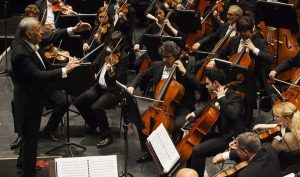Florence’s Maggio Festival: Festive Spring Music

Calendimaggio, or May Day, is a celebration that had its origins in pagan festivals. The revelry took place throughout the entire month: Florence, la città dei fiori, was decorated in flags, flowers, and draperies, and the streets filled with song, theater, and dance. The Maggio Musicale Festival was founded to continue the tradition of celebrating spring.
Founded in April 1933 by conductor Vittorio Gui, the aim was to present both contemporary and forgotten operas in new, innovative productions. It was the first music festival in Italy and in Europe, second only to the Salzburg Festival.
One of Verdi’s monumental grand operas, Don Carlo premiered in Paris in 1867. The composer based Don Carlo on Schiller’s play set in 16th-century Spain at the time of the Spanish Inquisition. Zubin Mehta will conduct the work at the Opera di Firenze on May 5, 8, 11, and 14.
The story is loosely based on the real life of Carlos, Prince of Asturias (1545–1568) and his father Philip II of Spain. In true melodramatic tradition, the story includes love triangles, unrequited love, political intrigue, and even the Great Inquisitor. A must-see opera for all, it combines some of Verdi’s most sublime music with a mysterious and profound drama
Mehta will conduct two additional concerts during the Festival. On May 10 he will lead the young Spanish cellist Pablo Ferrández in the Concerto Op. 104 for cello and orchestra by Antonin Dvorak. The mandolin will be the featured solo instrument in the concert with Mehta on the podium on May 13. Avi Avital from Israel will perform Vivaldi and the concert for mandolin composed for him by Avner Dorman. The evening ends with Anton Bruckner’s Symphony No. 4 in E-flat major, Romantische, considered a masterpiece of Austro-German high Romanticism.
On May 21, Thierry Fischer will direct the Maggio Musicale Orchestra in Charles Ives’ Unanswered question and the Rhapsody for alto, male choir and orchestra, Op. 53 by Johannes Brahms. The second half offers the Symphonie fantastique, Op. 14 (Fantastical Symphony: An Episode in the Life of an Artist, in Five Parts) by Hector Berlioz. Written in 1830 in the early Romantic period, it is believed that Berlioz composed at least part of it under the influence of opium.
The world-renowned Ensemble InterContemporain will perform a concert on May 26 of works by Debussy, Bartok, and Boulez in memory of its founder, the composer and conductor Pierre Boulez. Established in 1976, it is dedicated to the promotion of 20th- and 21st-century music.
The complete program and ticket information can be found at www.operadifirenze.it. (anne lokken)
